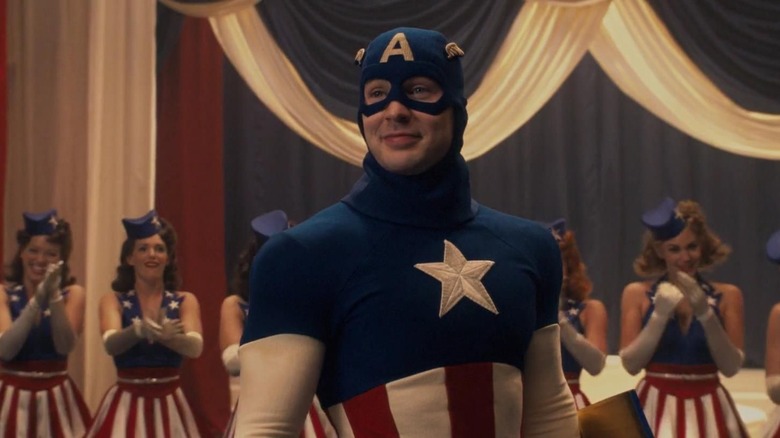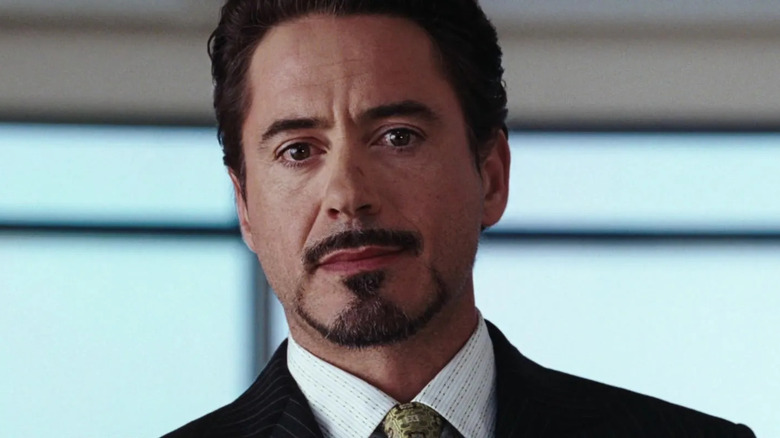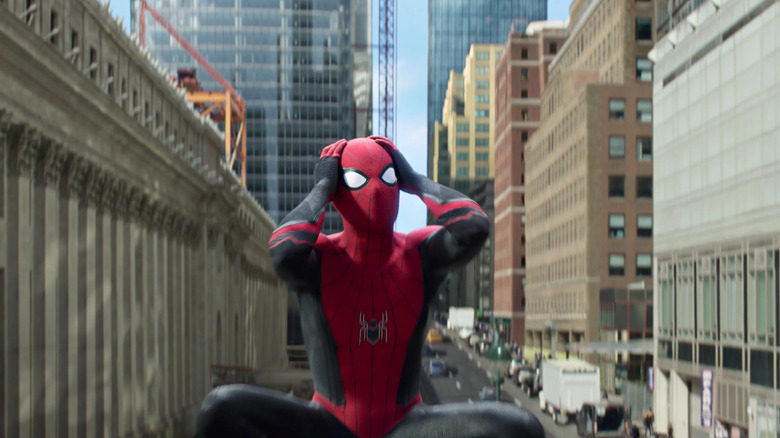Why So Many MCU Superheroes Don't Have Secret Identities
Fans of the Marvel Cinematic Universe certainly like to witness a well-choreographed scrape between their favorite super-beings and the attacking menace du jour. Audiences, at least in the 2010s, enjoyed massive, hard-knuckle punch-ups to a degree that crushed the worldwide box office. People took the MCU very, very seriously and entire online ecosystems mushroomed under the canopy of their influence. Theories were often floated over which MCU characters might win in a potential fight. From 2008 until at least 2019, the MCU was the world's most-read pop culture Bible.
But then, there's something silly about one superhero turning to another on the battlefield and yelling "Hey, Steve!" or "Where's Bruce?" The characters of the MCU usually refer to one another by their actual names rather than their superhero ones.
This sounds very odd to an old man like myself, who was raised on superhero comics wherein secret identities and alter egos were a vital, seemingly unshakable part of superhero lore. Spider-Man kept his face covered and never revealed his true identity to the world for fear that his enemies would be able to track him down or harm his loved ones. Batman remained in the shadows, offering the world vigilante justice in anonymity. Superman had to disguise himself as a human in order to live an ordinary life (though that changed in the CW series "Superman & Lois," which may speak to a point I plan to address later on).
Secret identities are exciting for multiple reasons. For one, they make any hero's story that much more dramatic; if they have to operate in secret, they will always be grappling with the parts of themselves they show the world and the parts they keep hidden. Secondarily, they make a hero seem that much more noble; if someone is enacting justice on a freelance basis, then they are clearly not doing so for recognition or financial reward. Thirdly, it inflames the imagination of a young reader. Is my dad Spider-Man? Could I be Spider-Man? You'd never know.
The MCU, however, largely discarded this idea from the jump, and there's at least one reason why.
Marvel Studios boss Kevin Feige doesn't like secret identities
Notably, at the end of Jon Favreau's 2008 film "Iron Man" (which launched the MCU), Tony Stark (Robert Downey, Jr.) announced at a press conference that he was indeed Iron Man. This flew in the face of decades of comic book lore and provided a large, dramatic twist. Speaking with Bleeding Cool in 2013 (as /Film reported on at the time), Marvel Studios boss Kevin Feige explained that one of the reasons he allowed Tony's identity revelation was that he was merely tired of the very notion of alter egos. As he put it:
"The one we haven't done in the MCU is the secret identity thing. I thought that had been overplayed for a long time. Which is why we had Tony Stark out himself at the end of his first movie. We were sort of announcing to the audience that we're not going to play that game."
Some may have bristled at the idea of a superhero without a secret identity in 2008, but the MCU, moving forward, normalized the idea. The bulk of MCU movies have tended to eschew the real world anyway, with few scenes of their protagonists out doing everyday chores. And if superheroes were never going to be in the real world, why bother with superhero names? Iron Man was Tony. Captain America was Steve Rogers. The Black Widow was Nat(asha Romanoff). One can imagine the relief the MCU's writers might've felt in not having to write any scenes of superheroes saying stuff like "I can't let my mom find out" or having to invent excuses for not being home on time.
There are, of course, notable exceptions to this rule, as superheroes like Daredevil (Charlie Cox), Spider-Man (Tom Holland), and Ms. Marvel (Iman Vellani) strive to keep their true identities under-wraps in the MCU. Still, there may be a bigger factor at play here than the storytelling caprices of one executive. Indeed, the lack of secret identities in the MCU may reflect a palpable cultural shift in the way young people contemplate fame.
The MCU's lack of secret identities may speak to a larger cultural shift
Recall that the bulk of the characters seen in the MCU were invented in the 1960s, long before the internet was a twinkle in Al Gore's eye. They were extrapolated from literary heroes like the Scarlet Pimpernel and Zorro, who wore masks and kept their identities hidden from the wicked politicians and royal a-holes who would otherwise execute them. There was, in those stories, a nobility to staying hidden. The heroes wanted to be known for their good deeds. Fame and money were seen as crass and unseemly goals for a hero.
In 2008, however, a generation of kids had already been raised with smartphones, and the nature of fame had changed dramatically. In this century, people just put their entire lives on social media in a relaxed, natural fashion. They're not just thirsty for "likes" (although "likes" certainly provide little endorphin hits), but it's now plausible for someone to do a dance on TikTok and become famous by accident. One can even make a living as an influencer. The promise of the modern world is that fame lurks around every corner, so long as you stay visible and keep your personal "brand" active. The idea of staying offline and toiling in anonymity is anathema to many people. If you're going to do something dramatic, you record that s*** and put it everywhere. (Don't forget to like and subscribe.)
In that cultural milieu, the "secret identity" is almost unthinkable. By 2008, it was natural for a superhero to keep their face hidden. Now, many of the MCU heroes are basically well-licensed celebrities. Some of them may even hire publicists or resent that they're less famous than their teammates. (Looking at you, Ant-Man.) Heck, Ms. Marvel even fashioned herself after her favorite hero, Captain Marvel (Brie Larson). There's no need to hide your identity when being famous is a natural outcropping of life.
The mask-less heroes now fulfill a new power fantasy for young audiences. You can be a hero, kid, and you can also be famous and beloved.


